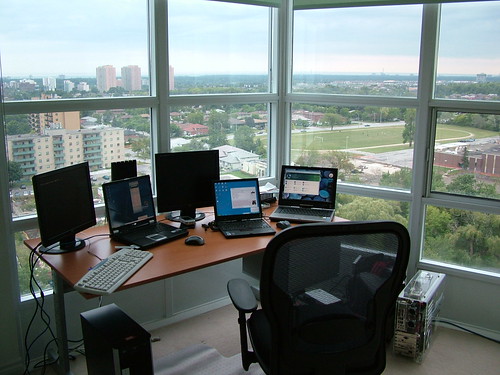




Our company is offering some employees a work from home program. I'm still unsure if it is right for me. A lot of my friends who have "gone home" to work are loving it. My biggest concern is missing the people interaction. Now, all these home offices look nice, but I still have to weigh the pros and cons of working from home. Here is an article I found here about the pros and cons of telecommuting.
June 11
| The Pros and Cons of Telecommuting |
Telecommuting has become an increasingly popular benefit offered by companies to their employees especially in the IT sector. Many people start these jobs without understanding the full implications of such a lifestyle choice.
As one of Portal Solution's full time remote employees, I'd like to share some of my experience and things I've learned to remain effective while telecommuting. Portal Solutions does allow their employees to work from home on occasion even when they are local, so this would apply on a smaller scale to that work situation as well.
The Pros of Telecommuting
Telecommuting has some advantages that make it a particularly attractive alternative for employees. While the telecommuting situation is most often desired by employees there are benefits to the employer as well.
- Physical commuting ceases to exist. The most amount of commuting I do on a daily basis is from my bedroom into the office, and there are no traffic jams in between.
- There is no dress code. I don't have to worry about ironing pants or shirts since I work in casual clothes all the time.
- You are close to family. Most jobs pull apart families for at least 40 hours a week, but in this situation that doesn't exist.
- More flexible than flex time. Telecommuting allows you to work when you want (within reason) as long as you complete your tasks and hourly requirements.
- Less distractions during the day. During a normal work day there are many impromptu meetings and discussions that can interrupt your workflow, and a remote worker often isn't included in those.
- Cheaper to have employees. If a company is completely a remote workplace then there is no need for physical offices, utilities, etc.
The Cons of Telecommuting
Even though telecommuting appears on the surface to be all positive there are some things to keep in mind.
- No real relationships with co-workers. One of the fun things about work is that your co-workers become your extended family. When you're remote it's difficult to build that level of familiarity especially when you miss out on birthday parties, company picnics, etc. Also, sometimes the most productive work happens informally, and it can't be duplicated working remotely.
- You are close to family. Even though this was listed as a pro it is also a con. Family can often get in the way of productive work if they are not giving you space while you work.
- Chores around the house await. For some reason when you're working from home the immediacy of needing to clean your apartment/house increases. It's not fun to work in disheveled environment.
- The need to travel. Some may view this as a pro or con, but telecommuting most often requires of the employee the need to travel whether to the main office or to a client site.
- The blurry line between work and home life. When going into an office it's much easier to separate your work from home life since they live in different physical locations but not so when telecommuting. Your home is your workplace, and if you're not careful one can consume the other.
Tips to Stay Productive
While there are pros and cons to working remotely there are some things you can do to stay productive and maintain a good relationship with your employer.
- Stay in constant communication. The responsibility lies with the remote worker to maintain active communication with everyone. You must not let yourself fall between the cracks.
- Be involved when you're in the office. Whenever I travel to the office I make an extra effort to do activities with my co-workers. This might be meals, hanging out at night, or even getting the opportunity to enjoy those informal conversations.
- Ensure personal accountability. The remote worker is responsible to an even greater degree that their tasks are being done effectively and efficiently. The best way to ensure this is to set up accountability for yourself and not wait on others to do it for you.
- Get into a working mindset. Some remote workers still dress up like they're going to work to ensure they stay in a work mindset. Do what you need to do to put your attention to work when it's time to do so.
- Set up work/home boundaries. After you've worked your eight or so hours for the day you have to consciously put work down to focus on your home life.
Conclusion
As you can see there are real pros and cons to this lifestyle, but when you take necessary steps to ensure success then both the employee and employer can have a successful experience.

![[office+chicago+home+mage.jpg]](https://blogger.googleusercontent.com/img/b/R29vZ2xl/AVvXsEjPwku-LJD3tQ_lkd8SOfkVZNT0B9JHzmxZw1eArfpDU_-tBkciGa1Ecnw3HrnRjD3RzbnunzME789MBqnxWjOXAe4FEVnPnQEex-d8KjnMBaCmqmRAeW4vSp7BW104W1ado1KYwBYpGbs/s1600/office+chicago+home+mage.jpg)


No comments:
Post a Comment